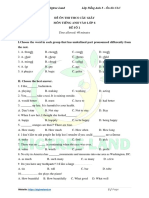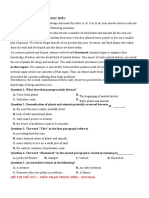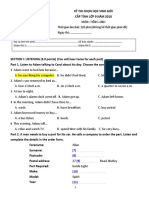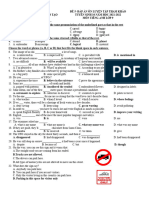0%(1)0% found this document useful (1 vote)
204 viewsPassive Voice With Modals
Passive Voice With Modals
Uploaded by
Hường NgôThe document provides exercises on using passive voice with modals. Exercise 1 asks to change active sentences to passive using modals like must, should, would etc. Exercise 2 is a multiple choice test on passive voice with modals. Exercise 3 asks to change active sentences to passive. The exercises focus on common modal verbs like can, may, must, should etc. and how to form passive sentences using these modals.
Copyright:
© All Rights Reserved
Available Formats
Download as DOCX, PDF, TXT or read online from Scribd
Passive Voice With Modals
Passive Voice With Modals
Uploaded by
Hường Ngô0%(1)0% found this document useful (1 vote)
204 views2 pagesThe document provides exercises on using passive voice with modals. Exercise 1 asks to change active sentences to passive using modals like must, should, would etc. Exercise 2 is a multiple choice test on passive voice with modals. Exercise 3 asks to change active sentences to passive. The exercises focus on common modal verbs like can, may, must, should etc. and how to form passive sentences using these modals.
Original Title
PASSIVE VOICE WITH MODALS
Copyright
© © All Rights Reserved
Available Formats
DOCX, PDF, TXT or read online from Scribd
Share this document
Did you find this document useful?
Is this content inappropriate?
The document provides exercises on using passive voice with modals. Exercise 1 asks to change active sentences to passive using modals like must, should, would etc. Exercise 2 is a multiple choice test on passive voice with modals. Exercise 3 asks to change active sentences to passive. The exercises focus on common modal verbs like can, may, must, should etc. and how to form passive sentences using these modals.
Copyright:
© All Rights Reserved
Available Formats
Download as DOCX, PDF, TXT or read online from Scribd
Download as docx, pdf, or txt
0%(1)0% found this document useful (1 vote)
204 views2 pagesPassive Voice With Modals
Passive Voice With Modals
Uploaded by
Hường NgôThe document provides exercises on using passive voice with modals. Exercise 1 asks to change active sentences to passive using modals like must, should, would etc. Exercise 2 is a multiple choice test on passive voice with modals. Exercise 3 asks to change active sentences to passive. The exercises focus on common modal verbs like can, may, must, should etc. and how to form passive sentences using these modals.
Copyright:
© All Rights Reserved
Available Formats
Download as DOCX, PDF, TXT or read online from Scribd
Download as docx, pdf, or txt
You are on page 1of 2
DO THI PHI ANH- MK
PASSIVE VOICE WITH MODALS
Exercise 1. Put the verbs into the most suitable passive forms.
1. It’s raining heavily. The match must be cancelled (must/ cancel).
2. The television should be repaired (should/ repair). It’s not working now.
3. If I didn’t do my job properly, I would be sacked (would/ sack).
4. A mystery is something that can’t be explained (can’t/ explain).
5. My bag has disappeared. It must have been stolen (must/ steal).
6. It’s a serious problem. I don’t know how it can be solved (can/ solve).
7. I wouldn’t leave your car unlocked. It might have stolen (might/ steal).
8. Those who don’t obey the traffic rules ………..… (should / fine) strictly.
Exercise 2: Choose the best answer.
1. Jack has a right to know. He ...................the news immediately. If you don't
do it, I will.
A. ought to tell B. ought to be told C. may tell D. may
be told
2. What I told Bill was a secret. He ..............it to you.
A. shouldn't have repeated B. shouldn't repeat
C. shouldn't be repeat D. shouldn't have been repeated
3. A package ...............carefully before it is mailed.
A. has to be wrapped B. has to wrap C. had to be wrapped
D. had to wrap
4. I don't know why Jessica wasn't at the meeting. She .................about it.
A. must forget B. must be forgotten
C. must have been forgotten D. must have forgotten
5. The games are open to anyone who wants to join in. Everyone .................
A. can be participatedB. could be partipated C. can participate D. could
participate
6. This burnt out light bulb .................days ago. Could you do it for me?
A. might be replaced B. might have been replaced
C. should have been replaced D. should be replaced
7. You'd better not drink that river water. It ................
A. could be polluted B. could pollute C. can be polluted D.
can pollute
8. I think everyone .............this paperback on the economic crisis. It contains
information that everyone should have.
A. should be read B. should read C. should have been read D.
should have read
9. Your passport ................... It is invalid without your signature.
A. is supposed to sign B. is supposed to be signed
C. was supposed to sign D. was supposed to be signed
10. A bald eagle ................from the other large birds by its white head and
white tail.
A. can distinguish B. can be distinguished
DO THI PHI ANH- MK
C. could distinguish D. could be distinguished
11. When you are on duty, your uniform ................. at all times.
A. must be worn B. must wear C. must have worn D. must
have been worn
12. Children …………. this book.
A. are not allowed to read B. are not allowed to be read
C. mustn’t be read D. are not let read
Exercise 3. Change these sentences into passive.
1. You can't wash this dress.
→............................................................
2. You should open the wine about 3 hours before you use it.
→.............................................................................................
3. Members may keep books for 3 weeks.
→......................................................
4. Passengers shouldn't throw away their tickets as inspectors may ceck them
during the journey.
→.......................................................................................
5. The manager must sign the cheque this week.
→..................................................................................
6. The teacher should buy the supplies for this class.
……………………………………………………………………..…
7. Somebody will call Mr. Watson tonight.
……………………………
10. John will receive the paper tomorrow morning.
………………………………………………
You might also like
- (123doc) Bai Tap Danh Dong Tu Va Phan Tu Gerunds and ParticiplesDocument2 pages(123doc) Bai Tap Danh Dong Tu Va Phan Tu Gerunds and ParticiplesDzung NguyenNo ratings yet
- Final Written Exam Course: Basic Five (B05) Book: World Link 1 / 3 Edition (Units 1Document4 pagesFinal Written Exam Course: Basic Five (B05) Book: World Link 1 / 3 Edition (Units 1piero eduardo aylas cordovaNo ratings yet
- Unit 5 - Further PracticeDocument2 pagesUnit 5 - Further PracticeĐức Dương ĐàmNo ratings yet
- Bai Tap Lien TuDocument17 pagesBai Tap Lien TumandyNo ratings yet
- Phrases and Clauses of Purpose ExercisesDocument3 pagesPhrases and Clauses of Purpose ExercisesDuy NguyễnNo ratings yet
- ĐỀ CƯƠNG ÔN THI HK1 - TIẾNG ANH LỚP 5 (23-24)Document11 pagesĐỀ CƯƠNG ÔN THI HK1 - TIẾNG ANH LỚP 5 (23-24)meolol549No ratings yet
- Unit 3: Teen Stress and PressureDocument9 pagesUnit 3: Teen Stress and Pressureanh trầnNo ratings yet
- Bài tập chuyên sâu anh 6 Global có key và file nghe UNIT 1Document8 pagesBài tập chuyên sâu anh 6 Global có key và file nghe UNIT 1Yến Nhi VõNo ratings yet
- Friends Global 11 - Unit 5Document7 pagesFriends Global 11 - Unit 5NhaNo ratings yet
- Đề 1: PHẦN A: NGỮ ÂM (1,0 điểm)Document5 pagesĐề 1: PHẦN A: NGỮ ÂM (1,0 điểm)Thanh Huyền100% (1)
- Exercise On ConjunctionsDocument10 pagesExercise On ConjunctionsphuNo ratings yet
- Đề kiểm tra Tiếng anh 7 Global Success có key unit 8Document8 pagesĐề kiểm tra Tiếng anh 7 Global Success có key unit 8Võ Việt NamNo ratings yet
- 1st Term Grade 5 - Speaking ReviewingDocument7 pages1st Term Grade 5 - Speaking ReviewingThu Lê Thị HiềnNo ratings yet
- Bộ 10 Đề Ôn Thi Cầu Giấy - Bigtree LandDocument36 pagesBộ 10 Đề Ôn Thi Cầu Giấy - Bigtree LandNguyễn NgaNo ratings yet
- BÀI TẬP BỔ TRỢ ANH 11 FRIENDS GLOBAL CÓ GIẢI CHI TIẾT-UNIT-5-ĐỀDocument13 pagesBÀI TẬP BỔ TRỢ ANH 11 FRIENDS GLOBAL CÓ GIẢI CHI TIẾT-UNIT-5-ĐỀEllie NguyenNo ratings yet
- Tuyển Chọn 95 Đề Luyện Thi HSG Tiếng Anh 7Document388 pagesTuyển Chọn 95 Đề Luyện Thi HSG Tiếng Anh 7Thúy NguyễnNo ratings yet
- CHUYÊN ĐỀ - VIẾT LẠI CÂU ÔN THI CHUYÊN ANH 6Document30 pagesCHUYÊN ĐỀ - VIẾT LẠI CÂU ÔN THI CHUYÊN ANH 6Lan Thi TuongNo ratings yet
- Choose The Best Answer (Circle A, B, or C) To Complete The Sentence. (2.0pts)Document9 pagesChoose The Best Answer (Circle A, B, or C) To Complete The Sentence. (2.0pts)Nguyễn Gia PhúNo ratings yet
- (ThichTiengAnh.com) 90 Bài Tập Tiếng Anh Có Đáp Án Chuyên Đề Sự Hòa Hợp Giữa Chủ Ngữ Và Động TừDocument7 pages(ThichTiengAnh.com) 90 Bài Tập Tiếng Anh Có Đáp Án Chuyên Đề Sự Hòa Hợp Giữa Chủ Ngữ Và Động TừHoàng MinhNo ratings yet
- Revision For The Midterm Test - Grade 10 - Test 1Document4 pagesRevision For The Midterm Test - Grade 10 - Test 1LinhLyNo ratings yet
- Tài Liệu Ôn Tập Hki Môn Tiếng Anh Lớp 11 (2023-2024)Document6 pagesTài Liệu Ôn Tập Hki Môn Tiếng Anh Lớp 11 (2023-2024)Tuan Anh100% (1)
- 30 Bài Đọc Hiểu (218 Câu) Từ Đề Thầy Phạm Trọng Hiếu -HocmaiDocument135 pages30 Bài Đọc Hiểu (218 Câu) Từ Đề Thầy Phạm Trọng Hiếu -HocmaiNgọc AnhNo ratings yet
- Bài Tập Phrasal VerbsDocument3 pagesBài Tập Phrasal VerbsHien NguyenNo ratings yet
- GE 8 Diff WS U1 1 ABCDocument6 pagesGE 8 Diff WS U1 1 ABCElnazir MustafaNo ratings yet
- Revision For Unit 1 + 2 + 3Document22 pagesRevision For Unit 1 + 2 + 3Chau NguyenNo ratings yet
- ĐỀ SỐ 07-HSG ANH 9Document9 pagesĐỀ SỐ 07-HSG ANH 9Linh Trúc0% (1)
- 2. PHÂN TỪ HIỆN TẠI VÀ PHÂN TỪ HOÀN THÀNHDocument1 page2. PHÂN TỪ HIỆN TẠI VÀ PHÂN TỪ HOÀN THÀNHnguyenvan100% (1)
- ĐỀ ÔN THI VÀO LỚP 6 LƯƠNG THẾ VINH MÔN TIẾNG ANH- CÔ TÔ THỦYDocument4 pagesĐỀ ÔN THI VÀO LỚP 6 LƯƠNG THẾ VINH MÔN TIẾNG ANH- CÔ TÔ THỦYLan Thi TuongNo ratings yet
- Revision For Test 1: Doan Thi Diem Secondary School Name: Class: 9Document10 pagesRevision For Test 1: Doan Thi Diem Secondary School Name: Class: 9Quang Nguyễn NhậtNo ratings yet
- Bài tập Anh 9 theo chuyên đề 5. VERB FORMS E9 (UNIT 7-12) NDocument8 pagesBài tập Anh 9 theo chuyên đề 5. VERB FORMS E9 (UNIT 7-12) NPhương NgaNo ratings yet
- (123doc) - De-Thi-Hoc-Sinh-Gioi-Tieng-Anh-8-Cap-Huyen-Co-Dap-AnDocument26 pages(123doc) - De-Thi-Hoc-Sinh-Gioi-Tieng-Anh-8-Cap-Huyen-Co-Dap-AnLâm Nguyễn hảiNo ratings yet
- Hk8a1 Thuvienhoclieu - Com de Cuong On Tap Giua HK1 Anh 8 GlobalDocument19 pagesHk8a1 Thuvienhoclieu - Com de Cuong On Tap Giua HK1 Anh 8 GlobalKhanhh HuyenNo ratings yet
- đề hsg vòng 2Document7 pagesđề hsg vòng 2Hoàng BùiNo ratings yet
- Dap An de Tham Khao So 5 ts102021 - 76202173546Document4 pagesDap An de Tham Khao So 5 ts102021 - 76202173546PHAT PHAM KIMNo ratings yet
- Gi A Kì Test 12Document5 pagesGi A Kì Test 12Trần Anh KhoaNo ratings yet
- Sách giáo viên - Tiếng Anh 12 Friends GlobalDocument12 pagesSách giáo viên - Tiếng Anh 12 Friends Globalthienlh9153No ratings yet
- Đề Cương Ôn Tập Giữa Và Cuối I Anh 9Document3 pagesĐề Cương Ôn Tập Giữa Và Cuối I Anh 9ChươngCôngTrầnNo ratings yet
- De Cuong Anh 6 Ki IiDocument5 pagesDe Cuong Anh 6 Ki IiHiển Vũ TiếnNo ratings yet
- Solutions Elementary - Unit 6B - Going Wild (Grammar)Document16 pagesSolutions Elementary - Unit 6B - Going Wild (Grammar)nntuanbcaNo ratings yet
- Tieng Anh 12 Friends Global Unit 1 Practice Test 67052ba321b3ahkb03Document6 pagesTieng Anh 12 Friends Global Unit 1 Practice Test 67052ba321b3ahkb03lacademy04062007No ratings yet
- Anh TS10 (cấu trúc câu)Document7 pagesAnh TS10 (cấu trúc câu)Nari KimNo ratings yet
- English 7 - Revision For The 1st Term TestDocument9 pagesEnglish 7 - Revision For The 1st Term TestMinh Quang NguyễnNo ratings yet
- (123doc) - Practices-Test-11Document3 pages(123doc) - Practices-Test-11Nhi ThảoNo ratings yet
- De Thi Thu Vao Lop 10 Mon Tieng Anh Chuyen Truong THPT Ha Noi AmsterdamDocument11 pagesDe Thi Thu Vao Lop 10 Mon Tieng Anh Chuyen Truong THPT Ha Noi AmsterdamDuy QuốcNo ratings yet
- On Tap Ngu Phap Tieng Anh Lop 7 Unit 1 My HobbiesDocument4 pagesOn Tap Ngu Phap Tieng Anh Lop 7 Unit 1 My HobbiesNhư QuỳnhNo ratings yet
- Excelling in Grammar B1 Exercises With KeyDocument115 pagesExcelling in Grammar B1 Exercises With Keybarcatoday10No ratings yet
- Global Success 8 Unit1:Leisure TimeDocument36 pagesGlobal Success 8 Unit1:Leisure Timek60.2112340047No ratings yet
- Bài tập bổ trợ Family and Friends National 3 G3 UNIT 6Document9 pagesBài tập bổ trợ Family and Friends National 3 G3 UNIT 6Anna HoNo ratings yet
- Bài tập liên từ (Conjunctions)Document3 pagesBài tập liên từ (Conjunctions)Hoang AnNo ratings yet
- Đ thi g m 14 trang. Thí sinh tr l i vào đ thi ề ồ ả ờ ềDocument18 pagesĐ thi g m 14 trang. Thí sinh tr l i vào đ thi ề ồ ả ờ ềNguyễn Quỳnh HươngNo ratings yet
- (Giao An Boi Duong Hoc Sinh Gioi Tieng Anh 7Document83 pages(Giao An Boi Duong Hoc Sinh Gioi Tieng Anh 7PhonghaNguyễnNo ratings yet
- E8 UNIT 3ffDocument4 pagesE8 UNIT 3ffNguyễn Đức HiệpNo ratings yet
- ÔN THI HỌC SINH GIỎI 2 (2021-2022)Document10 pagesÔN THI HỌC SINH GIỎI 2 (2021-2022)17.Tô Minh KiệtNo ratings yet
- bài tập câu trực tiếp, gián tiếpDocument49 pagesbài tập câu trực tiếp, gián tiếpXuan HoangNo ratings yet
- Thi Thu GDĐT Quận Cầu GiấyDocument3 pagesThi Thu GDĐT Quận Cầu GiấyTú BíNo ratings yet
- De Cuong On Tap Giua Ki 1 Tieng Anh Lop 6 Ilearn Smart WorldDocument6 pagesDe Cuong On Tap Giua Ki 1 Tieng Anh Lop 6 Ilearn Smart WorldPham Thi Tra Giang100% (2)
- 300 câu trắc nghiệm tiếng anh cấp 1 (có đáp án) - Aland EnglishDocument26 pages300 câu trắc nghiệm tiếng anh cấp 1 (có đáp án) - Aland EnglishLê MyNo ratings yet
- ĐỀ KHẢO SÁT TIẾNG ANH VÀO 6 TRƯỜNG ARCHIMEDES NĂM HỌC 2020-2021 (25-4)Document3 pagesĐỀ KHẢO SÁT TIẾNG ANH VÀO 6 TRƯỜNG ARCHIMEDES NĂM HỌC 2020-2021 (25-4)Healing EnergyNo ratings yet
- CHUYÊN ĐỀ 15 - SENTENCE TRANSFORMATION (Chuyển đổi câu)Document15 pagesCHUYÊN ĐỀ 15 - SENTENCE TRANSFORMATION (Chuyển đổi câu)Kiều DiễmNo ratings yet
- BÀI TẬP CÂU BỊ ĐỘNGDocument7 pagesBÀI TẬP CÂU BỊ ĐỘNGCẩm Chi LêNo ratings yet
- Modal Verbs in The PassiveDocument2 pagesModal Verbs in The Passivenew trendNo ratings yet
- Unit 6 - G10Document3 pagesUnit 6 - G10Hường NgôNo ratings yet
- ĐỀ CƯƠNG CUỐI KỲ- KHỐI 10Document12 pagesĐỀ CƯƠNG CUỐI KỲ- KHỐI 10Hường NgôNo ratings yet
- Hoc Sinh GioiDocument12 pagesHoc Sinh GioiHường NgôNo ratings yet
- Unit 6 - G 10Document8 pagesUnit 6 - G 10Hường NgôNo ratings yet
- Test 1 U6 - G10Document6 pagesTest 1 U6 - G10Hường NgôNo ratings yet
- G - 10 - Unit 8 - FinDocument8 pagesG - 10 - Unit 8 - FinHường NgôNo ratings yet
- Final Test 1 Grade 10Document4 pagesFinal Test 1 Grade 10Hường NgôNo ratings yet
- Unit 5. InventionsDocument8 pagesUnit 5. InventionsHường NgôNo ratings yet
- Unit 5. InventionsDocument8 pagesUnit 5. InventionsHường NgôNo ratings yet
- De Thi HSG Cum 2015 - 2016 - Anh K10Document6 pagesDe Thi HSG Cum 2015 - 2016 - Anh K10Hường Ngô0% (1)
- Unit 4. For A Better CommunityDocument8 pagesUnit 4. For A Better CommunityHường NgôNo ratings yet
- Unit 4-Test 1: Dedication, Boredom, DonateDocument7 pagesUnit 4-Test 1: Dedication, Boredom, DonateHường NgôNo ratings yet
- Test 1 Unit 5 - Grade 10Document9 pagesTest 1 Unit 5 - Grade 10Hường NgôNo ratings yet
- Structural Linguistics: Saussure'S Theory Key ConceptsDocument33 pagesStructural Linguistics: Saussure'S Theory Key ConceptsMariana100% (1)
- ContinueDocument3 pagesContinuePhyo KoNo ratings yet
- Lesson Plan (Grade 10TH) Unit 11 - Language FocusDocument4 pagesLesson Plan (Grade 10TH) Unit 11 - Language FocusSir CrocodileNo ratings yet
- Maximum Phonation Time and S/Z Ratio in A Large Child CohortDocument5 pagesMaximum Phonation Time and S/Z Ratio in A Large Child CohortRebekah ChenNo ratings yet
- Magya Onyame - Full ScoreDocument1 pageMagya Onyame - Full Scorebrsw9szpzzNo ratings yet
- 18 - iPLANDocument5 pages18 - iPLANMarlyn CaballeroNo ratings yet
- Kövecses 2006 Happiness and Pain StructureDocument12 pagesKövecses 2006 Happiness and Pain StructureFon SlowlifeNo ratings yet
- Grammar and Vocabulary Cuid c1Document34 pagesGrammar and Vocabulary Cuid c1juan64roblesNo ratings yet
- The L2 Learners May Feel More Fluent Singing Along To Song Lyrics Than They Do Speaking An L2Document2 pagesThe L2 Learners May Feel More Fluent Singing Along To Song Lyrics Than They Do Speaking An L2Risha Rahma Fitri 2005135799No ratings yet
- Farewell To Barn and Stack and TreeDocument37 pagesFarewell To Barn and Stack and TreeafilukmanprofNo ratings yet
- GI A2PLUS Communication Games U8 Teacher's NotesDocument1 pageGI A2PLUS Communication Games U8 Teacher's NotesAldanaVerónicaSpinozziNo ratings yet
- An Inquiry by EmailDocument4 pagesAn Inquiry by EmailNway Nway Hlaing100% (1)
- April Minggu 1Document4 pagesApril Minggu 1bpoppsmk. ayaniNo ratings yet
- Mental Models in Cognitive ScienceDocument46 pagesMental Models in Cognitive ScienceogrebinNo ratings yet
- Describing People: A Descriptive Composition About A Person Should Consist ofDocument3 pagesDescribing People: A Descriptive Composition About A Person Should Consist ofabril iñon rukavinaNo ratings yet
- Year 5 English Long Term Plan 21 22Document9 pagesYear 5 English Long Term Plan 21 22Edison GuillenNo ratings yet
- ADM Org Man Module 1 Meaning Functio Types and Theories of ManagementDocument17 pagesADM Org Man Module 1 Meaning Functio Types and Theories of ManagementJoanalyn DavidNo ratings yet
- Hand Out in FilipinoDocument15 pagesHand Out in Filipinoliandave446No ratings yet
- Grade 5 DLL English 5 Q4 Week 4Document7 pagesGrade 5 DLL English 5 Q4 Week 4Lem AirevolNo ratings yet
- Punctuation by StepDocument41 pagesPunctuation by StepEmaan kashafNo ratings yet
- Detailed Lesson Plan in MTB MLE 3Document8 pagesDetailed Lesson Plan in MTB MLE 3Jessa Marie Pailano100% (1)
- Unit 2B.: That'S Me in The Picture!Document15 pagesUnit 2B.: That'S Me in The Picture!francisco javier cañadas martinezNo ratings yet
- Grammar Future Tenses Module3Document2 pagesGrammar Future Tenses Module3ArtNo ratings yet
- Marking Scheme Grade 7 Set 1Document13 pagesMarking Scheme Grade 7 Set 1maureentheru48No ratings yet
- Skripi Bahasa InggrisDocument105 pagesSkripi Bahasa InggrisIndah DaulayNo ratings yet
- 2BAC - Booklet - Unit 2Document11 pages2BAC - Booklet - Unit 2Sanoui FaouziNo ratings yet
- What Are The Goals of Teachers Who Use The Direct Method?Document4 pagesWhat Are The Goals of Teachers Who Use The Direct Method?Hưng NguyễnNo ratings yet
- B Communication Final Assigmt FFFFGGGGDocument10 pagesB Communication Final Assigmt FFFFGGGGnewaybeyene5No ratings yet
- Grammar Practice Past Simple Sentences WorksheetDocument2 pagesGrammar Practice Past Simple Sentences WorksheetGabriela Hidalgo PrendasNo ratings yet






































































































